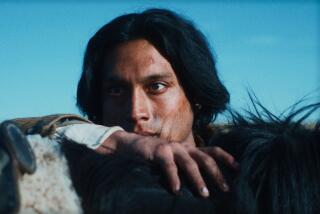MOVIE REVIEW : ‘Quigley’: New Premise, Old Territory
- Share via
“Quigley Down Under,” the new Tom Selleck movie, has the panoramic scope of a movie epic but the soul of a television movie. It’s about Matthew Quigley (Selleck), a sharpshooter from Wyoming who hires himself out to a slimy cattle baron (Alan Rickman) in western Australia only to discover that his job entails picking off aborigines. In retaliation, he tries to pick off his employer.
The film’s 1860s period details and Panavision outback vistas are sumptuous without being very exciting; it’s the Window Dressing school of movie-making. For audiences whose experiences with epics is limited to the small screen, “Quigley” (citywide) will probably go down very easily. It’s affably inconsequential.
The film’s premise, however, is interesting enough to rate a larger scope. “Quigley” is a new-style revisionist Western, with aborigines replacing American Indians, and dingoes standing in for coyotes.
At first, it’s kicky watching the film’s Wild West conventions played out in the outback; everything seems familiar yet slightly out of kilter. For Americans, the genocidal push of the white settlers in Australia against the aborigines plays like a variation on our own sorry history. Director Simon Wincer (“Lonesome Dove”) doesn’t employ the aborigines as Stone Age savages. He gives them their due--their dignity.
He gives them so much dignity, in fact, that their destruction takes over the movie and wipes out the rest of the action. Quigley is partnered throughout most of the film with a woman known as Crazy Cora (Laura San Giacomo), who has been loco ever since she accidentally suffocated her baby in a Comanche raid in the States years before. Cora drifts in and out of sanity, but what really gets Quigley’s goat is that she persists in calling him “Roy”--the name of the husband who left her. As they trek across the outback, pursued by the cattle baron’s riflemen, they strike up a daffy, easygoing camaraderie. Their scenes together are alternately cartoonish and “sensitive.”
Their periodic forays into aboriginal territory take the film into more serious terrain, but the scenes are too short. And there’s another problem. Even though Wincer and screenwriter John Hill are careful to humanize the aborigines, Quigley is set up as their savior. He’s the Great White Father figure in this genocidal tragedy, and there’s more than a whiff of paternalism in the conception. It’s never pointed out that Quigley’s powers as a savior reside almost entirely in the barrel of his custom-made, six-foot Sharps rifle. Compared to the aborigines’ arsenal of spears and darts, he’s practically Superman.
Tom Selleck, with his relaxed, TV-star presence, fits into this movie’s undemanding scheme. He’s self-confidently mild, and he keeps the film watchable without imparting any darker shades to Quigley’s do-good-ism. (Quigley won’t even sleep with Cora until she calls him by his real name.) San Giacomo seems a bit too urban and wised-up for her role’s moist sentimentality. She overdoes the looniness but she’s better in Cora’s lucid moments. She seems almost thankful for those moments.
As in “Die Hard,” Alan Rickman steals the movie (rated PG-13). His cattle baron is a transplanted Britisher who idolizes the American West and fancies himself a man out of his element. He thinks he really belongs in Dodge City going toe to toe with Wyatt Earp. Rickman gives this skunk’s character such an oily finesse that his killing sprees play like black comedy. Rickman is the best man-you-love-to-hate villain the screen has seen in ages and, clearly, he has it in him to be a lot more than that--as anyone who saw him on stage in “Les Liaisons Dangereuses” will attest. He’s a classically trained actor with a relish for high-gloss smarm, and his infernal delight is infectious.
The best thing about “Quigley Down Under” is that it keeps him alive for so long.
More to Read
Only good movies
Get the Indie Focus newsletter, Mark Olsen's weekly guide to the world of cinema.
You may occasionally receive promotional content from the Los Angeles Times.










